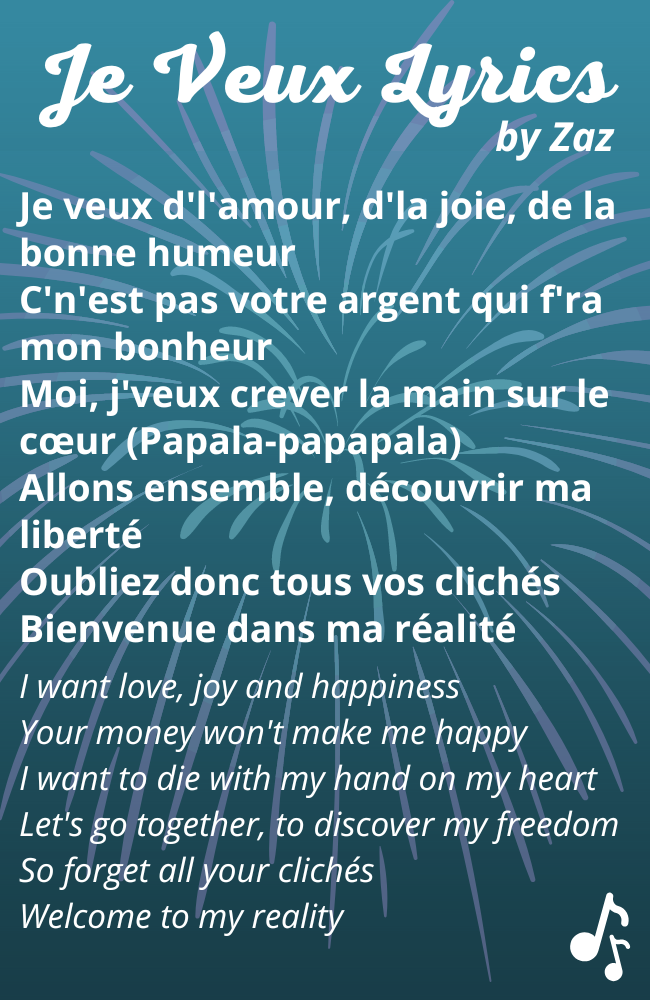
“Je Veux” (Meaning: I want; Pronunciation ʒə vø) is the greatest hit song of French singer, Zaz (Isabelle Geffroy). The song was released in 2010 on debut album, also called “Zaz“. The song’s lyrics are a statement against materialism. This post provides detailed analysis of grammar and vocabulary of the French lyrics.
Become an expert in French song lyrics!
On of the best and most fun ways to learn French is by listening to the lyrics of French songs. On this site we’ve provided detailed analysis of Indila’s (one of France’s leading female singers), including “Dernière Danse” and “Tourner Dans La Vide“. For Stromae, a leading French-speaking Belgian singer, we have pages covering hits biggest hits “Alors On Danse“, “Papaoutai” and “Formidable“. For some classic French songs we have pages covering “La Vie En Rose“, Non, Je Ne Regrette Rien” and “Sous Le Ciel De Paris” (all by Edith Piaf), “Ne Me Quitte Pas” (by Jacques Brel), “La Mer” (by Charles Trenet), Les Champs Élysées (by Joe Dassin) and “Je T’aime…Moi Non Plus” (by Serge Gainsbourg).
Song overview
In the song, “Je Veux”, Zaz sings about various material luxuries such as a suite in the Ritz (une suit au Ritz), jewelry from Chanel (des bijoux de chez Chanel) and a limousine (une limousine). She then simply asks: “What would I do with all that” (J’en ferais quoi?).
Then, in the following verse she states a blatant message against material happiness by saying: “I want love, joy and happiness; I want to die with my hand on my heart (Je veux d’l’amour, d’la joie, de la bonne humeur; j’veux crever la main sur le cœur).
She then invites the listener to join her in the persuit of true happiness: “Let’s go together, to discover my freedom” (Allons ensemble, découvrir ma liberté).

Line-by-line Lyrics Analysis
In the following section we have selected lines from the song’s lyrics which we feel offer interesting insights into French vocabulary and grammar.
A quick note about “Je veux”
The words of the song’s title, “Je Veux” means “I want” in French. They come from the verb “vouloir”, which means “to want”. This page on our site offers conjugations tables for all the major tenses for vouloir.
Another commonly used phrase related to “je veux” is “je voudrais”, which means “I’d like”. This page covers “je voudrais” in detail.
Donnez-moi une suite au Ritz, je n’en veux pas
This line translates to “Give me a suite at the Ritz, I don’t want it”. “Donnez-moi” is the imperative (commanding) form of “donner” (to give). This page on our site covers the imperative tense in detail.
“Je n’en veux pas” can translate to both “I don’t want it/any/them”. “En” is 1) An indirect object pronoun referring back to the previously mentioned topic (a hotel suite in this case) and 2) Used for verbs followe by “de”. We discuss how to use “en” on our page covering French object pronouns.
Des bijoux de chez Chanel, je n’en veux pas
This line translates to “Jewelry from Chanel, I don’t want it”. The French preposition “chez“ means “at the home or place of”. It is also used for companies. This page on our site covers “chez” in detail.
Donnez-moi une limousine, j’en ferais quoi ?
This line translates to “Give me a limousine, what would I do with it?”. “J’en ferais quoi?” translates to “What would I do with it?”. “Ferais” is the conditional form of the verb “faire” (to make or do). “Quoi” is a way of expressing “what” in French.
This page on our site covers the verb faire in detail, offering conjugations and example sentences for all the major tenses. This page covers “what” in French and has a section on the word “quoi”. Finally, this page explores the conditional “would” tense in detail.
Un manoir à Neuchâtel, c’n’est pas pour moi
This line translate to “A mansion in Neuchâtel, it’s not for me”. “Un manoir“ translates to “manor house”, but we simply translated it to “mansion”. Neuchâtel is a town in Switzerland on Lake Neuchâtel that has a beautiful castle.
“C’n’est pas” is a shortening of “ce n’est pas”, which means “it isn’t” or “that isn’t”. This page on our site examines when to use “c’est”.
Je veux d’l’amour, d’la joie, de la bonne humeur
This line translates to “I want love, joy and happiness”. “Bonne humeur“ translates to “happiness”. The expression, “être de bonne humeur” means to be in a good mood. “D’la” is a shortening of “de la”, meaning “some”.
Moi, j’veux crever la main sur le cœur
This line translates literally to “I want to die with my hand on my heart”. The expression, “avoir le cœur sur la main” means to “to be open-handed” or “big-hearted”. The word “moi” is a stressed pronoun means “me” and is used to added emphasis to “je” (I). This page on our site covers various ways to say “me” in French. Finally, “j’veux” is a shortening of “je veux”.
Oubliez donc tous vos clichés, Bienvenue dans ma réalité
These two lines translate to “So forget all your clichés, Welcome to my reality”. The word “donc“ has several translations including “so” and “therefore”. The word “bienvenue“ means welcome, which we cover in detail on this page.
J’en ai marre d’vos bonnes manières, c’est trop pour moi
We translated this line to “I’m sick of your your good manners, they’re too much for me”. The expression “en avoir marre de“ means “to be fed up”. An equivalent expression that’s not as strong is “en avoir assez de”. The “d’vos” is a shortening of “de vos”, meaning “of your”.
Moi, je mange avec les mains et j’suis comme ça
This line translates to “I eat with my hands and that’s the way I am”. “Je suis comme ça” translates literally to “I am like that”. “J’suis” is a shortening of “je suis” (I am). We’ve covered “je suis“ in detail on this page.
Je parle fort et je suis franche, excusez-moi
This line translate to “I speak loudly and I’m honest, excuse me”. The adjective “franc/franche“ means frank, open or candid. A synonym for “franc” is “honnête“.
Finie l’hypocrisie moi j’me casse de là
We translated this line to “Hypocrisy is finish, I’m outta here”. The verb “casser“ means “to break” and “se casser” means “to be out of here”. “On se casse” translates to “let’s get out of here” and is slang for “on y va” or “allons-y” (let’s go).
J’en ai marre des langues de bois
This line translate to “I’m sick of doublespeak”. “Langue de bois“ (literally “language of wood”) is an expression meaning doublespeak, waffle or snowballing.
Regardez moi, toute manière j’vous en veux pas
This line translates to “Anyways, look at me, I’m not angry at you”. “Toute manière” is a shortening of “de toute manière“, which means “anyhow”, “anyway” or “in any case”. ” j’vous en veux pas” is a shortening of “Je ne vous en veux pas”. “S’en vouloir à quelqu’un“ means to be angry or annoyed at somebody.
Je Veux French Lyrics & English Translation
Donnez-moi une suite au Ritz, je n’en veux pas
Des bijoux de chez Chanel, je n’en veux pas
Donnez-moi une limousine, j’en ferais quoi ? (Papala-papapala)
Offrez-moi du personnel, j’en ferais quoi ?
Un manoir à Neuchâtel, c’n’est pas pour moi
Offrez-moi la Tour Eiffel, j’en ferais quoi ? (Papala-papapala)
(Cha-lapapa-dapa-papa-lapa-lapa-ladee-dada-papa)
Give me a suite at the Ritz, I don’t want it
Jewelry from Chanel, I don’t want it
Give me a limousine, what would I do with it?
Give me staff, what would I do with them
A mansion in Neuchâtel, it’s not for me
Give me the Eiffel Tower, what would I do with it?
Je veux d’l’amour, d’la joie, de la bonne humeur
C’n’est pas votre argent qui f’ra mon bonheur
Moi, j’veux crever la main sur le cœur (papala-papapala)
Allons ensemble, découvrir ma liberté
Oubliez donc tous vos clichés
Bienvenue dans ma réalité
I want love, joy and happiness
Your money won’t make me happy
I want to die with my hand on my heart
Let’s go together, to discover my freedom
So forget all your clichés
Welcome to my reality
J’en ai marre d’vos bonnes manières, c’est trop pour moi
Moi, je mange avec les mains et j’suis comme ça
Je parle fort et je suis franche, excusez-moi
Finie l’hypocrisie moi j’me casse de là
J’en ai marre des langues de bois
Regardez moi, toute manière j’vous en veux pas
Et j’suis comme ça J’suis comme ça (Papala-papapala)
I’m sick of your your good manners, they’re too much for me
I eat with my hands and that’s the way I am
I speak loudly and I’m honest, excuse me
Hypocrisy is finish, I’m outta here
I’m sick of doublespeak
Anyways, look at me, I’m not angry at you
And that’s the way I am
Je veux d’l’amour, d’la joie, de la bonne humeur
C’n’est pas votre argent qui f’ra mon bonheur
Moi, j’veux crever la main sur le cœur (Papala-papapala)
Allons ensemble, découvrir ma liberté
Oubliez donc tous vos clichés
Bienvenue dans ma réalité
I want love, joy and happiness
Your money won’t make me happy
I want to die with my hand on my heart
Let’s go together, to discover my freedom
So forget all your clichés
Welcome to my reality
Je veux d’l’amour, d’la joie, de la bonne humeur
C’n’est pas votre argent qui f’ra mon bonheur
Moi, j’veux crever la main sur le cœur (Papala-papapala)
Allons ensemble, découvrir ma liberté
Oubliez donc tous vos clichés
Bienvenue dans ma réalité
I want love, joy and happiness
Your money won’t make me happy
I want to die with my hand on my heart
Let’s go together, to discover my freedom
So forget all your clichés
Welcome to my reality
Listen to “Je Veux”
The official video for “Je Veux” on YouTube has over 46 million views!
You can also listen on Spotify:
